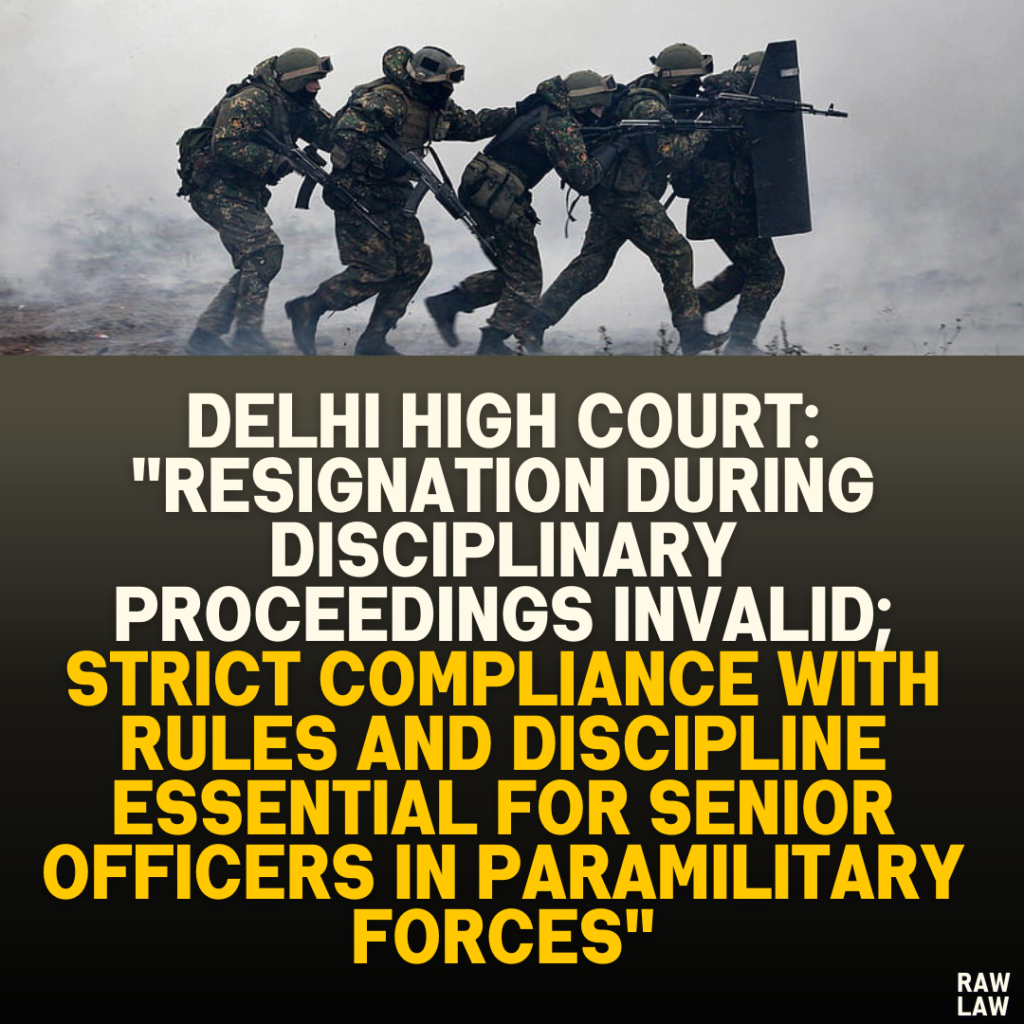Court’s Decision
The Delhi High Court dismissed the writ petition challenging the dismissal of a Central Reserve Police Force (CRPF) officer. It held that disciplinary proceedings were conducted in compliance with legal procedures, and resignation cannot be accepted during the pendency of such proceedings unless deemed necessary in the public interest. The court emphasized that maintaining discipline in paramilitary forces is paramount, and senior officers are expected to lead by example.
Facts
- The petitioner, serving as an Assistant Commandant in the CRPF since 2003, was sanctioned 40 days of earned leave from 02.02.2015 to 13.03.2015.
- Instead of reporting back to duty on 14.03.2015, the petitioner submitted multiple requests for extensions of leave, citing back pain and providing a medical certificate.
- The CRPF directed him to seek treatment at the nearest CRPF hospital, but he did not comply. The petitioner cited the long distance (300 km) to the nearest hospital as the reason for his non-compliance.
- On 14.11.2015, the petitioner submitted a resignation letter, citing domestic issues, and later formalized his resignation with a prescribed undertaking in November 2016.
- The resignation was initially processed but was later returned by the Ministry of Home Affairs (MHA) after instructions from the Department of Personnel and Training (DoPT), recommending disciplinary action for unauthorized absence.
- Disciplinary proceedings were initiated in September 2018 under the Central Civil Services (Classification, Control, and Appeal) Rules, 1965. The charges of unauthorized absence and disobedience of orders were found to be proved after an inquiry, resulting in the petitioner’s dismissal in May 2021.
Issues
- Resignation During Inquiry: Could the petitioner’s resignation be accepted despite pending disciplinary proceedings?
- Validity of Disciplinary Proceedings: Were the disciplinary proceedings against the petitioner conducted in accordance with procedural and legal norms?
- Proportionality of Punishment: Was the penalty of dismissal from service disproportionate to the charges?
Petitioner’s Arguments
- Right to Resign: The petitioner argued that resignation is a fundamental right of an employee and should have been accepted when tendered, especially since senior CRPF officials initially recommended it.
- Procedural Violations: He alleged that the initiation of disciplinary proceedings after approving his resignation was contrary to established principles.
- Disproportionate Punishment: The petitioner contended that the penalty of dismissal was excessive, given his prior 12 years of unblemished service.
- Medical Reasons Ignored: He highlighted that his absence was due to genuine health concerns, and the CRPF failed to consider his medical condition while deciding his case.
Respondent’s Arguments
- Unauthorized Absence: The respondents emphasized that the petitioner overstayed his leave without permission and failed to report to duty despite repeated directions.
- Non-compliance with Orders: The petitioner disobeyed lawful directions to seek treatment at the nearest CRPF hospital, undermining discipline in the force.
- Pending Inquiry: The respondents pointed out that the petitioner’s resignation could not be accepted during a pending inquiry, per government rules.
- Justified Dismissal: They argued that dismissal was a proportionate response to the petitioner’s misconduct, considering his unauthorized absence and non-compliance with directives.
Analysis of the Law
- Office Memorandum on Resignation: The court referred to Office Memorandum No. 28034/4/94-Estt.(A), which states that resignations during pending inquiries or investigations are generally not accepted unless necessary in the public interest.
- Importance of Discipline: The court stressed the critical role of discipline in paramilitary forces, noting that senior officers must adhere to high standards and set an example for others.
- Judicial Review in Disciplinary Proceedings: The court reaffirmed the principle that judicial review of disciplinary matters is limited to cases of procedural irregularities or grossly disproportionate punishment.
Precedent Analysis
- The court relied on settled principles that judicial review does not extend to reappreciating evidence from disciplinary proceedings.
- It held that courts intervene only in cases where punishment is blatantly disproportionate to the charges or where procedural safeguards are violated.
Court’s Reasoning
- Failure to Participate: The petitioner did not actively participate in the inquiry or provide evidence supporting his medical condition.
- Disobedience of Orders: He failed to comply with directives to report to the CRPF hospital for treatment, undermining the chain of command and discipline.
- No Procedural Lapse: The court found no evidence of procedural irregularities in the disciplinary proceedings.
- Fabricated Excuses: The court observed that the petitioner’s excuse of a distant CRPF hospital was invalid, as a unit hospital was located in his place of residence.
- Medical Fitness Ignored: Despite being declared medically fit in November 2015, the petitioner chose to resign instead of resuming duty.
Conclusion
The court dismissed the petition, holding that the disciplinary proceedings were lawful, and the punishment of dismissal was proportionate to the petitioner’s misconduct.
Implications
- Resignation and Discipline: This case clarifies that resignation cannot be a tool to evade disciplinary action, especially in disciplined forces like the CRPF.
- Importance of Adherence to Rules: Senior officers in paramilitary forces must adhere to strict rules and set examples of compliance and accountability.
- Limited Judicial Review: The judgment reinforces that courts exercise limited review in disciplinary matters, focusing only on procedural fairness and proportionality of punishment.



